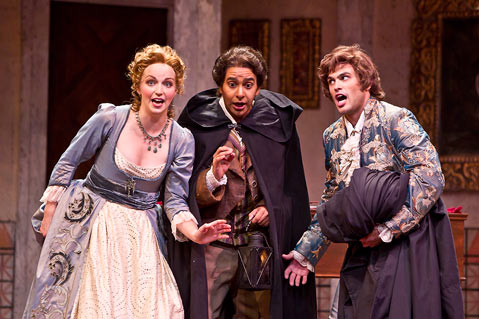The Barber of Seville at the Granada
The Music Academy of the West Presented Rossini’s Opera on Friday, August 5.

Extremely well-known and full of instantly recognizable music, Rossini’s The Barber of Seville is hardly what you would call a “traditional” work. “Riotously subversive, yet somehow still classic” is closer to the truth, and what better definition for comedy? While the barber Figaro (José Rubio) has come to symbolize the Machiavellian contrivances that are the heart of the opera’s plot, all the other major characters—from Figaro’s client, Count Almaviva (Marco Stefani), to his rival, the jealous guardian Dr. Bartolo (DeAndre Simmons); his ward, Rosina (Julia Dawson); and their advisor/music teacher, Don Basilio (Brandon Cedel)—attempt tricks of their own. Apparently it’s not unusual in Beaumarchais’ version of Seville for several elaborate con jobs to be operating simultaneously in a single household. And, of course, most of the scheming winds up being unnecessary, as the opera’s subtitle, The Barber of Seville, or the Purposeless Precaution, reminds us. It’s as though Rossini were having a laugh about the predictability of comedy, and the inevitable marriage that must occur at its end. But along the way, there are attitudes to be struck, arrangements to be made, and, above all, plenty of things to sing about.
Great acting and great ensemble singing were what put this particular production on a sturdy foundation, but it was the unusual and exciting level of interplay between the orchestra and the soloists that took it to great heights. Arias were consistently distinguished by some noticeably significant dynamic between the singers and the instrumentalists. In one example, Cedel’s singing of Don Basilio’s aria in praise of scandal benefited enormously from the way Warren Jones conducted the insinuating orchestral rhythm that undermines Basilio’s fatuous attempt at sophistication. “You may be proud of your wiles, Don Basilio,” the music seems to say, “but you’re not going to fool these people.” And when Count Almaviva finally comes clean about his identity, what does that say about all the pretending he’s done? As Almaviva, Stefani sang beautifully and won the audience over with his great timing and fearless delivery of numerous comic voices.
As Rosina, soprano Dawson looked to be having the time of her life. She used every inch of the elaborate and beautiful set to augment her outstanding vocal performance with dramatic energy. Her byplay with the hilarious Simmons as Dr. Bartolo was especially comic and elicited some of the night’s biggest laughs. Rosina, like many comic opera heroines, can seem woefully under-motivated, falling in love at something less than first sight and losing faith in her lover immediately after being tricked by Bartolo, then changing her mind again just moments later. But the integrity of her music, and the ways that it underscores her connections to the men onstage—in particular her coconspirator and hairdresser, Figaro—always brings the situation around to something believable, or at least believably amusing. Some of the clowning in The Barber of Seville is gratuitous, but amusing nonetheless, but what’s really exciting is when the comedy, the music, and the singers all come together in one sustained burst, as in the marvelous crowd scene involving the police investigation of a disturbance at Dr. Bartolo’s.
The faculty of the Music Academy’s vocal program is to be congratulated for continuing to raise the level of these opera performances from one season to the next. Conductor Jones and stage director Bruce Donnell ought to team up again soon.



